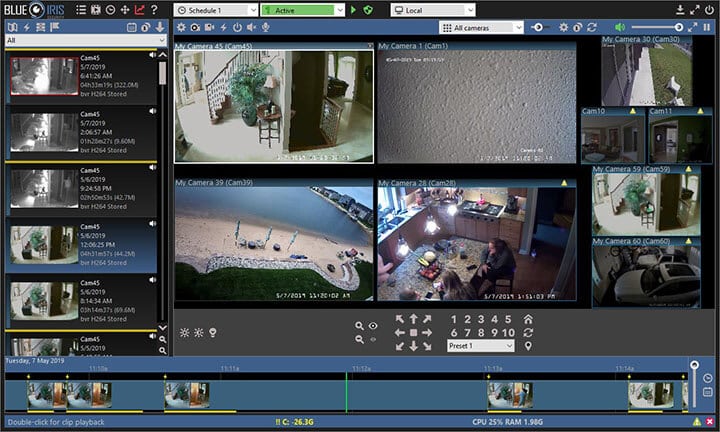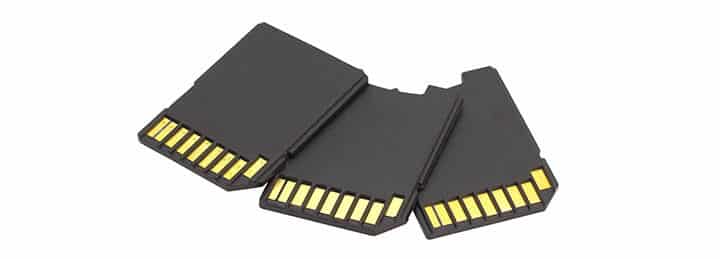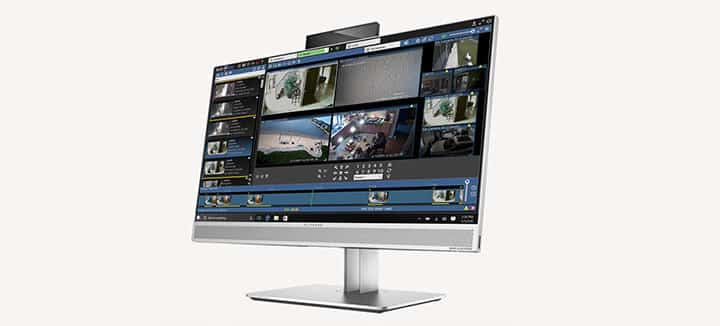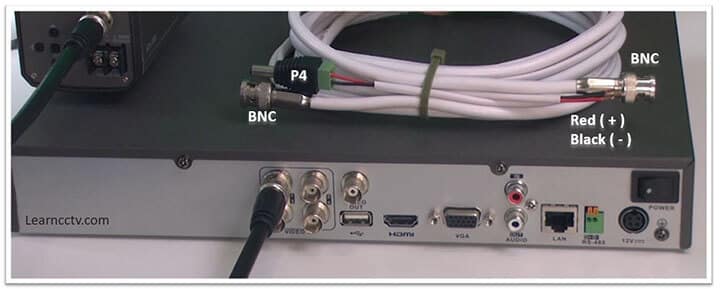Installing security cameras in your home and property ensure you that it will be safe and secure, so you need to learn how to record security camera footage.

Image from the Blue Iris Website
Security camera recorders are important components of your home security,
They are indispensable as they are responsible for saving the footage of your security camera system for investigation and evidence.
That is why it is important that you choose the right security camera recorder which will work properly with your security system. In other words, compatibility, good quality and features are the keys to a successful security system.
Let us talk about the common IP camera recorders which are available in the market. Also how you can store CCTV videos through the security camera recorder software.
Popular Security Camera Recorders
There are generally five security camera recorder types for you to choose from.
Let me talk about each of them, so you can understand how they work and that will help you with your decision making.
Digital and Network Recorders (DVR/NVR)
If you want to do 24-hour recording on your analog security camera system, you can use a Digital Video Recorder (DVR).
A DVR converts the analog signal from the camera into a digital format that can be recorded in a hard drive, that's why this device must have one.
The picture below show a inexpensive DVR that comes with a 1TB hard drive.
Digital Video Recorder
Check the Price on the Amazon Store
Or if you have IP cameras, use a Network Video Recorder (NVR) which must be compatible with the camera brand you are using or with the ONVIF protocol.
A NVR receives the video directly from the IP camera with no need for analog to digital conversion since everything is already digital.
There are a lot of different device brands, but if you want to use a device that is very simple to setup and has a good price, I recommend trying a Zosi NVR.
Network Video Recorder
Check the Price on the Amazon Store
Both devices work with internal or external hard drives for local recording and they are very reliable to storage the security camera's footage.
A single security camera DVR/NVR can manage multiple security cameras all at the same time, That is, depending on the channels you choose.
For instance, up to 16 cameras installed into the system may be supported by a 16-channel security camera DVR/NVR.
You might be wondering if a security camera DVR recorder can work without a hard drive. Well, the answer would be a yes. However, they will not be able to record any videos which you can watch or playback later.
Hence, it will not serve the real purpose of a security camera DVR system.
However, today’s modern technology has given us security camera DVR/NVR with an internal hard disk drive. An external HDD may also be added to expand the storage space of your security camera recorders.
However, one important thing to bear in mind is that you need to check the security camera and DVR/NVR compatibility before buying devices from different brands.
==> If you have IP cameras and NVR with different brands and want to make them work together, consider using the ONVIF or RTSP protocol. You can find more information in the articles:
Recording Security Camera Footage on SD Cards
Security camera footage can be locally recorded on SD cards or Micro SD cards.

That depends on the type of security camera you are using and it is also called onsite recording or edge recording.
There are security cameras that come with built-in micro SD cards. However, with some, you need to make a separate purchase on your own for it. This goes for security cameras with SD card slot.
A word of advice: Before you purchase an IP security camera, inquire about the equipment first. Ask the seller pertinent details about the recording features.
For instance, learn about its required capacity, read and write speed, and the format of supported SD cards. This way, you will not make the wrong choice when buying the camera or an SD card to keep the footage.
==> To learn more about SD cards, read the article: Memory Card for CCTV.
However, if you do not want to go into the fuss of choosing and buying SD cards and such, it is recommended that you get an IP security camera that comes with the SD card. This way you will not have problems with compatibility issues.
Security Camera Recording to PC/Laptop
The cheapest way to have a standalone security camera recorder is to use your spare PC or laptop to store your videos.
You just need to use a piece of software such as the Blue Iris. Then you will be able to save security motion activated recordings to your laptop or PC for 24 hours.

Image from the Blue Iris Website
However, you must keep your laptop or PC running all the time as a surveillance camera recorder. Besides, the footage may take up a large portion of the storage space of your computer.
Security Camera Recording to an FTP Server
The FTP server may also be used as a free security camera recorder for the motion-activated recordings. Also for 24-hour recordings.
This IP camera recorder gives you easy access to your files from anywhere.
Therefore eliminating the need to be on-site for playback or for downloading files.
A lot of security cameras today can upload and store images and videos to an FTP server. Hence without the need for a DVR/NVR.
You can use a service such as the FTP Camera website.
Security Camera Recording to a Cloud Server
The use of a Cloud as a security camera recorder has become popular these days. The Cloud is used as a pay-to-use camera storage solution.
Storing in the Cloud does not only provide an extra level of security by allowing off-site backup of your sensitive and important files. It also allows you to access them wherever and whenever you need it.
You can use the cloud service recording provided by the camera manufacturer for Free (or with low cost) or use a paid Cloud Storage service such as the AngelCam.
Which Security Camera to Choose
Now comes the most important part – decision making. So, if you are wondering about what security camera to choose, get one which fits your needs.
The Number of Security Cameras
How many security cameras do you have?
This is an important factor. If it is just a camera or two, then an SD card recorder and a laptop/PC would be adequate for security camera motion activated recordings.
If you have multiple cameras, then the DVR/NVR system is recommended.
You need to choose the recorder based on the number of channels, which means the number of cameras you have it the deciding factor.
Take note, though, that the security camera Cloud recording service NVR only work with security cameras of similar brands. Unless they use a universal protocol as mentioned previously in this article (ONVIF).
The Surveillance System Recording Mode
Base your selection on your needs. The security camera you choose must be based on your preferences.
You must take into consideration your preferred recording modes. The storage capacity of home security camera recorders is different. Therefore, when you choose the best security cameras base your decisions on the following:
- The motion-activated recording of the security camera: It must be suitable for the motion-activated security camera recorders.
- The capability of your security camera to record continuously: It must be ideal for security camera DVR/NVR and security cameras recording to Cloud.
- Remote Access: Your system must provide an easy way to setup access via a mobile phone, tablet or laptop from the Internet.
- Multi-brand capability: Ideally, you must choose a system that works with different camera brands or at least can use the ONVIF or RTSP protocol.
The Budget For The Surveillance System
Another important factor to consider is your budget. Consider the price of the security camera you want to buy. It may suit your needs, but, can you afford the price? The price range of these security varies according to the brand and quality.
The next table shows the average price for consumer security cameras in the US, considering 4-channels recorders and FTP or cloud service for 7 days.
Device or service | Price |
|---|---|
Digital Video Recorder (DVR) | $110 to $180 |
Network Video Recorder (NVR) | $150 to $250 |
Analog Security Camera | $20 to $50 |
Digital Security Camera (IP) | $40 to $110 |
Computer/Laptop | $ 500 |
FTP server | $ 3.50/month |
Cloud Service | $ 5.99/month |
The FTP and Cloud services cost is per camera, per month.
The example is for the Camera FTP and Angelcam Cloud services respectively.
Internet
The Internet connection on the location where you will install the security camera recorder system must also be considered. Your chosen security camera may be limited by the network speed and Internet connection on its location.
Scalability
When you need to add more IP cameras and increase storage space, you must consider the scalability of the security camera recorders.
Both the security camera Cloud recording and DVR/NVR recorders are capable of excellent flexibility and scalability for storing data.
Compatibility
As previously mentioned you need to make sure your cameras are compatible with the recorder, if you are using analog cameras look at the type of technology they use such as HD-TVI, HD-CVI, AHD or CVBS.
If you are using digital (IP) cameras, look for the brand, since camera and recorders with the same brand use the same proprietary protocol and work better.
How A Security Camera Recorder Works
You just need to install your security cameras and connect them to the recorder and open the device menu for some adjustments such as date/time and recording mode. At first, the setup is very easy and some recorders have a setup wizard.
==> Read the article: CCTV basics (for beginners) for more details.
The system starts recording the footage 24/7 until the hard drive is full and then it deletes the oldest recording to have space for the new ones.
Which means you will always have access to the footage that is recorded for a specific number of days, such as 7,15 or even 30 days, depending on the hard drive specification, recording quality, CODEC, recording mode, and other factors.
==> To learn more about the factors that affect the recording time and quality, read the articles: Bandwidth and storage for CCTV and CCTV Storage Calculation with Formula and Examples.
You can have a redundant recording system, meaning your cameras can be recorded locally in the DVR/NVR and send the footage to an FTP or Cloud Server at the same time, thus preventing you lose your recordings if your recorder is destroyed or stolen.
It's also possible to record in the camera SD card (if you are using an IP camera) and in the Network Video Recorder simultaneously.
Final Words
Before purchasing the security cameras, make sure you make the practical choice.
Consider its price, your preferences, your purpose for getting one, and above all, the brand.
It cannot be denied that equipment from reputable brands is more durable, reliable, and efficient. Also, they come with the warranty and support from company experts.



